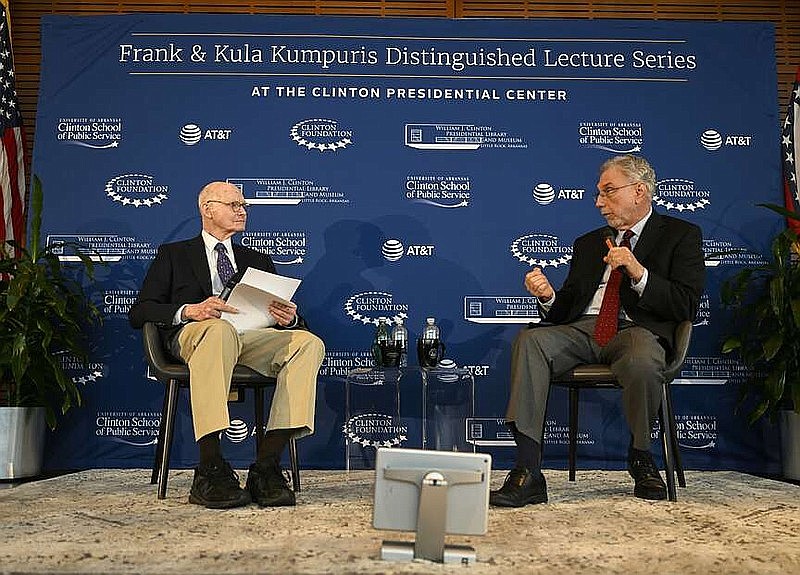Former Washington Post Executive Editor and author Martin "Marty" Baron told former Arkansas Democrat-Gazette Publisher Walter E. Hussman Jr. on Tuesday that journalists "have a lot of work to do" to regain the public's declining trust in their work.
Hussman and Baron spoke at the Clinton Presidential Center in Little Rock as part of the Frank & Kula Kumpuris Distinguished Lecture series. The former publisher, who is chairman of WEHCO Media, Inc., posed several questions to Baron, including why Americans' trust in journalists is at an "all-time low." He cited Gallup polling that indicated their faith in reporters has decreased since 1979.
Baron said the Watergate scandal, which resulted in former President Richard Nixon's resignation in 1974, marked a period in which public trust in journalism was high. However, he said trust can be difficult to parse in today's highly polarized society.
"I think trust is a real complicated subject, because trust tends to cut along partisan lines," he said.
For instance, people who watch Fox News tend to "lean heavily to the right" and are skeptical of other news outlets. People who trust such news outlets as The Washington Post, The New York Times and CNN "don't trust Fox News at all," according to Baron.
The stakes around trust in journalism are high to Baron. When asked, via a question submitted by a member of the public, whether he thought former President Donald Trump or the loss of newspapers in communities was a greater threat to democracy in America, he replied, "Can I say both?"
Baron said news organizations bind communities together. However, those newspapers are declining along with the public's trust in journalism. Between late 2019 and the end of May 2022, the U.S. lost over 360 newspapers, many in economically struggling or traditionally underserved communities, according to a 2022 report published by Northwestern University's Medill School of Journalism. The diminishment of the public's access to news poses "a clear threat to democracy," according to Baron.
One tactic for improving public trust in the media is to "rededicate ourselves to doing our work in an objective way," he said.
Hussman asked him to comment on the news media's obligation to provide both sides of a story.
While Baron said it was necessary to get information from all sides involved -- and that there are usually more than two -- and must also rigorously examine the entirety of the available evidence.
"Ultimately, the objective is to try to get at the truth," he said.
Baron spoke of his time as editor of The Boston Globe, during which the publication won six Pulitzer Prizes, including for its investigations into the Catholic Church and its concealment of sex abuse by clergy; the coverage was later portrayed in the 2015 film "Spotlight." He also touched on his experience serving as editor during the entirety of Trump's term in the White House, emphasizing journalists' obligations to their profession and the pursuit of the truth, and he talked about the shift away from print to digital media.
Speaking after the event, he said he "wouldn't single out Arkansas or the South" as facing challenges different from those confronting the country as a whole.
"I think our democracy is in a pretty fragile state," he said. "Sadly, we treat people who are political opponents as political enemies, and I don't think we should."
Baron sold and signed copies of his new book, "Collision of Power: Trump, Bezos and The Washington Post," following the lecture. The memoir examines his role leading the newspaper as Trump and Bezos began "their epic feud," according to the publisher.

